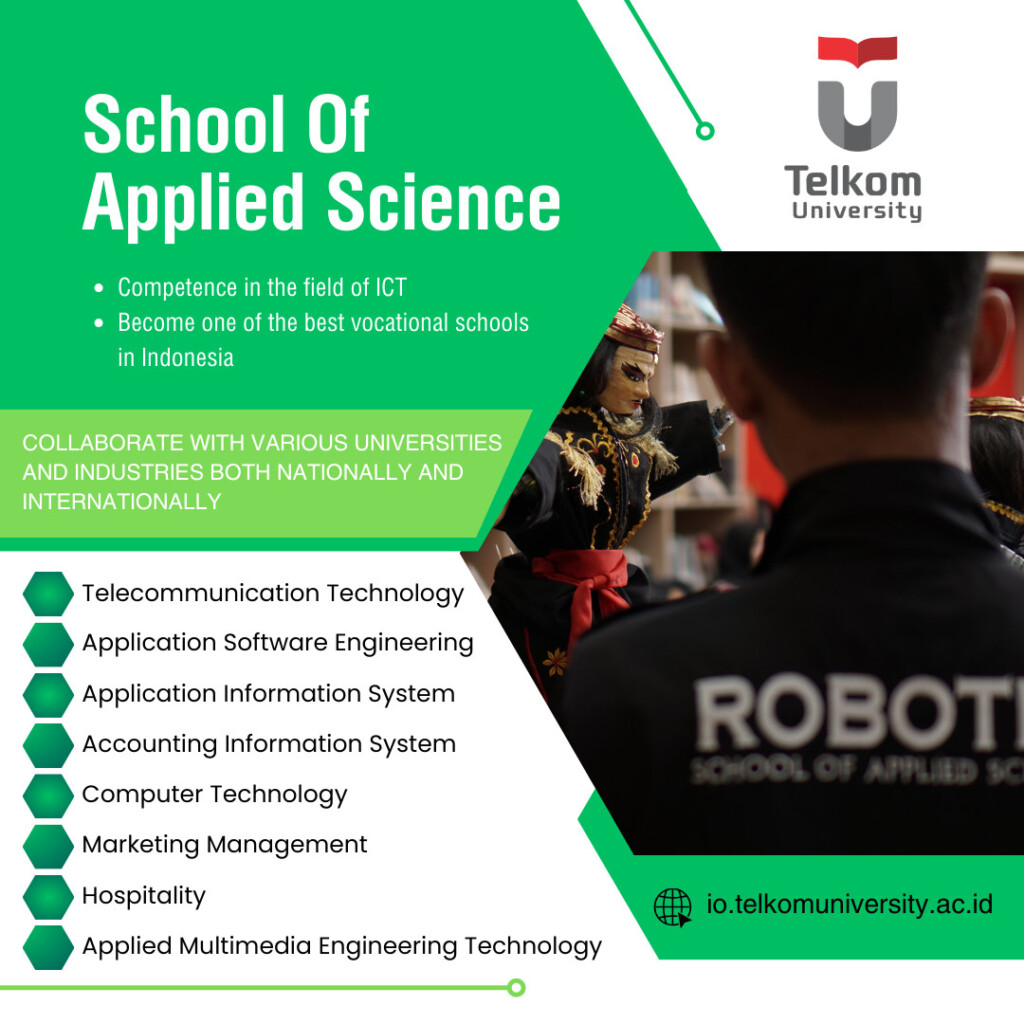
Established in 2013 Telkom University’s School of Applied Sciences (FIT) is one of seven faculties at Telkom University that focus on vocational education. To support the competence of graduates who are skilled and match with industry needs, the vocational education curriculum is designed to be 60% practice and 40% theory. In addition, students will also be equipped with national and international competency certifications. To support student’s creativity and entrepreneurial skills, the school formed an incubation platform through the ESSTaV-FIT (Ekosistem Sinkronisasi Startup di Vokasi – Fakultas Ilmu Terapan) programme, Internships, Competitions, Community Service and Research Projects.
School of Applied Science comes with a mission to contribute to the Indonesian nation and the world community to produce graduates who have an international outlook and have the ability to compete globally. It is stated in the credo Giving and Caring the World. TYPICAL Development System (Knowledge, Hardskill, Attitude and Softkill) are aspects which will continuously be developed as a preparation to enter the industry. Applied learning system using System Comence approach, namely: Coaching, Mentoring, and Coaching. This method is an appropriate means for vocational education that promotes increased competence in the field of ICT.
As a new vocational colleges, the presence of Telkom Polytechnic directly bring an atmosphere of academic competition is increasing. Evidently, in 2011 won the National Student Achievement level as the third winner, and the following year in 2012 won the first winner of Student Achievement National level. Not only that, in English, Telkom Polytechnic team in 2013 won second place for the National Polytechnic English Olympic competition at the polytechnic level in Indonesia, and in 2012 won the Third Place National University Debating Competition for the competition at the college level generally as Indonesia.
School of Applied Sciences become one of the best vocational faculties/schools in Indonesia consists of 6 study programme namely :
- Diploma Degree of Telecommunication Technology
- Diploma Degree of Application Software Engineering
- Diploma Degree of Information System
- Diploma Degree of Accounting Information System
- Diploma Degree of Computer Technology
- Diploma Degree of Marketing Management
- Diploma Degree of Hospitality
- Bachelor Degree of Applied Multimedia Engineering Technology
It also has over 37 laboratories to support learning activities, this school is also has collaborated with various universities and industries both nationally and internationally.
Polytechnic Telkom also fairly close cooperation with industry. At the end of 2012 Telkom Polytechnic renew the concept of Industrial Work activity, the students will be involved professionally in the industry and got the same treatment as well as regular employees. That is, students who complete the program will receive remuneration Industrial Work and other rights as an employee. Until the year 2013 was more than 500 students are absorbed by the industry in the Industrial Work program involving more than 20 companies in the telecommunications industry, banking, information systems, media, consumer goods, and one representative of the International Labour Organization institutions.
Vision :
To become a superior vocational school in applied research and entrepreneurship by 2023 that plays an active role in the development of applied technology, management and tourism based on information technology.
Mission :
- Organising superior vocational education with industry-oriented learning with international standards.
- Developing, disseminaing, and applying applied technology, management and tourism that are recognised by international standard industries.
- Utilising applied technology, management and tourism for the welfare and advancement of the nation’s civilisation through the development of entrepreneurial competencies.
Purpose :
- Producing vocational graduates who have integrity, competence and national and international competitiveness
- Produce research orks in the field of applied science that can be published at the international level
- Producing community service activities and innovation products that are beneficial for the economic development of the community
- Creation of trust from all stakeholders both nationally and internationally